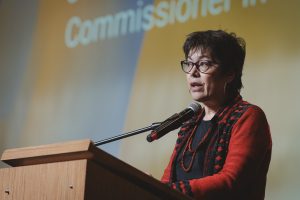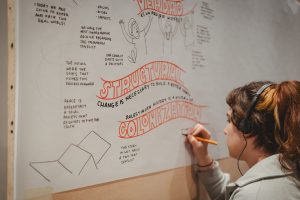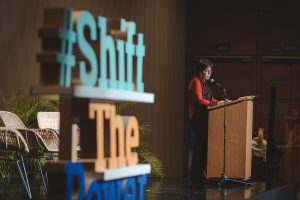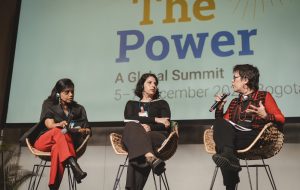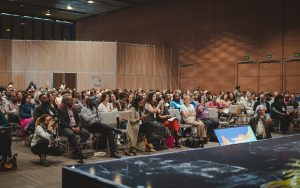#ShiftThePower Global Summit keynote address from Marta Ruiz
04 Jan 2024
Marta Ruiz, Journalist and former Truth Commissioner in Colombia, delivered these remarks on 6 December as part of the #ShiftThePower Global Summit programme. She was then joined on stage by Ambika Satkunanathan of the Neelan Tiruchelvam Trust (Sri Lanka) and Soheir Asaad of the Rawa Creative Palestinian Communities Fund (Palestine) for a discussion on the links between building peace and #ShiftThePower.
This week I read a phrase by Bosnian writer Velibor Colic, who had to go into exile in France. He said: “Peace does not come after war. Anger, sadness, disease, grief and hatred do. Even in times of peace, war remains a living, breathing thing.” That is exactly why a Truth Commission is a necessary step in the transition from war to peace. In our case, it was a long and complex war, which entrapped within it, like a magnet, a series of historical, social, political and criminal violence. A series of geological faults in the foundations of the nation. Abandoning this war that still throbs like an open wound in our territories is not easy.
Peacebuilding requires more than an agreement, more than physical reconstruction, more than the silencing of guns, more than the return home of ex-combatants and exiles. Peacebuilding is much more than these fragments that we have received. More than these political programmes that we have seen. Because peace is a right, an ethical imperative, and in our case, a matter of survival as a people. Peace involves an exercise of moral imagination. Of imagining something that those of us who still breathe Colombia’s air have never had. Not killing each other is something unknown to us.
The Truth Commission of Colombia, which was born from the peace agreement signed in 2016 between the government of Juan Manuel Santos and the FARC-EP, was precisely one of the mechanisms designed for the transition, for the closure of the fratricidal conflict that we have suffered. The truth is not an exercise in speculation about the past, nor is it an academic exercise in which a mission of experts is called to determine causes and consequences. A truth commission is, above all, a hinge between the past and the future. It is a moment that, to put it in very fashionable terms, compels you to think about the here and now, to process the trauma, the pain and all the feelings and also demands for justice that we have, but it also forces us to think about how we are going to live together in the same territory, despite our differences, the damage we have caused, our form of loneliness and our abysses.
I come to share with you what we did, the legacy that we have left and that is still palpitating in the country, but above all, I come with the deep conviction that even though we have not achieved the whole peace, great peace that we dreamed of, the truth has settled as a value of democracy. The silence has been broken. The fear of looking at the past has become a necessary public conversation. Victims in Colombia play a central role today, and although we are far from a comprehensive and exhaustive reparation, we are on the right path.
The Colombian Truth Commission was designed for three years, which with the COVID-19 pandemic became almost four. I want to point out that these were a few years where a major event occurred. The search for truth was a milestone that touched the lives of many. A great opportunity that the communities took on with enthusiasm and conviction. Because we never thought that the truth was a philosopher’s stone in the hands of 11 Commissioners, but something that belongs to the people and that we had to build with the people, with a basic plan but also in a very intuitive way.
In record time, the Commission deployed its efforts in 28 Houses of Truth in the territories, traveling along rivers and mountains, to listen to the people. Because that is what a Truth Commission is about, an exercise in listening, an opportunity to recognize ourselves and gain back our empathy. We had the opportunity to listen to more than 30,000 people in individual and collective interviews. But the existence of the Commission itself unleashed a process in which the communities themselves began to listen to each other. To come together and redefine their history. They submitted over a thousand reports on the various topics that our extensive 13-point mandate required us to clarify about the causes, developments and consequences of the conflict.
This is the case, for example, of the people (almost a million) who have gone into exile or as refugees outside the country’s borders. Or of the ethnic peoples who were able to speak to the Commission in their various languages. Or of the boys and girls. The combatants, both guerrilla, paramilitaries, military, and police members. And of all their mothers. And also of the witnesses, such as priests or journalists, and of the experts. Presidents also appeared before the Commission, all those who are alive; ministers, congressmen, and even drug lords. Under the Commission, but not necessarily under its control, a dialogue or symbolic event was held every single day.
We could say that a tangible result of that great movement for the truth was a Ten-Volume report, which gathers many resolved truths, as well as others that remain unresolved, and must continue to be unearthed. A large internet platform with endless information about the conflict, and the most complete archive on human rights, conflict and peace that exists in Colombia, and which last week was accepted by UNESCO for safeguarding.
But it is not those tangible results that I want to talk about, but rather what is behind it, what was managed to be stripped off and what is yet to be removed. Because the truth is not an act of illumination or a revelation. It is a historical process of making and changing collective consciousness, which takes time, comings and goings, dialogue, changing minds; it requires going through various feelings and emotions, and it of course requires reaching some basic agreements about what happened, because relativism and denial do not lead to peace, and also about non-repetition. And we will have to continue in our discussions about disagreements, which are basically about causes and responsibilities. That is why a Truth Commission is always a mechanism that drives the process to make it unstoppable, unrelenting, but that process in the hands of the citizens is what will lead us to reconciliation and to stop killing each other.
I want to talk about the fact that we are a wounded Nation. The victims in Colombia are everywhere, in all social levels, in all regions, in all ethnicities, occupations, beliefs. But this has been a war with ten million victims, particularly from rural areas, the vast majority of which lost their lands and their community lives. We have half a million people murdered in almost four decades and 120,000 people missing. These deadly figures reveal the type of war we had: 90% of those who lost their lives were unarmed civilians. Mostly rural inhabitants. Young men. So, behind these figures there is a palpable reality: mothers who lost their children, but also children who grew up without their parents. It must be recognized that the war was carried on the shoulders of those who survived it: women. They took the orphans under their wing, they have searched for the missing, they are fighting for a land that the laws denied them because they were women, and they are teaching us the path of forgiveness and, also, of lasting peace. The peace of Colombia, I have no doubt, is in the hands of everyone, but especially women. And without true social justice for the territories, for the rural sector, there can be no true peace.
The Commission was able to feel the impact of this disproportionate violence not only on the people, but also on their feelings, as I said before, of hatred, fear, and loneliness. The feeling that their dignity was sullied. Also, in the breakdown of the most beloved community values, such as intergenerational dialogue, solidarity and, above all, trust. The war broke trust in the social covenant: that basic pact under which institutions are there to protect us. And, for multiple reasons, they failed to do so. The social fabric is greatly wounded by violence, by the assassination of leaders, and requires great efforts to inject it with real capacities for collective action. In that sense, truth goes hand in hand with the need for real human development, which allows us to rebuild life projects. That takes time, and that is why you don’t have to think about three- or five-year plans. It will take one or two generations.
The Colombian war was, likewise, and it somehow still rages on, a mixture of motivations and political contexts, with a series of social conflicts, such as agrarian issues, criminal wars, and fights over profits, both legal and illegal. It is not an easy war to put a stop to, because there are multiple interests in it, actors of very diverse origins, both national and international. But it was essentially a war for political power and democracy. An ideological war where the opposing sides, insurgency, and the State, took the notion of the enemy to unimaginable extremes, with practices of violence that were openly war crimes and crimes against humanity.
The guerrillas took kidnapping to extremes rarely seen in the world. There were more than 50,000 kidnappings in those four decades, and there were cases in which the hostages were shot and, in some cases, held for up to 15 years in captivity. The paramilitaries committed more than 2,000 massacres and are responsible for most of the cases of missing persons. Thousands of mass graves, of which several are rivers, are currently being found in a long-term endeavor that requires patience and strong community work. The State, in addition to its alliance with the paramilitaries, has had to respond for out-of-combat executions of innocent boys who were falsely passed for guerrilla members. There are more than 6,000 such cases.
During its mandate, the Commission dealt with a task that I wish to highlight, and which, in a judicial setting, has also been dealt with by the Special Jurisdiction for Peace, which is the court created to try these crimes. I am talking about the voluntary recognition of responsibilities, which during the Commission period managed to bring together victims and perpetrators, and sometimes victims from one side and the other, or perpetrators who were at odds in the war. This is a very challenging task because victims do not want a half-truth. They want to be told in detail about the manner, time, and place of the events. This has been a task that has, perhaps, only been undertaken in South Africa, and which I believe is key.
In Colombia, there is a very silent, although exceptionally public, awareness of what happened to us. Listening to those responsible for atrocious acts acknowledge their crimes, but also provide some type of explanation for what happened has been an exercise that will require time to be assimilated by society. But there is still a long way to go, because a war is not just a matter of those who took up arms. Behind wars, there are very strong political and economic frameworks that call for much more in-depth reflection. They require a revision of economic models that ravage communities and promote the violation of human rights, and those serious faults of democracy that mean that social conflicts between communities and elites often end up resolved through violence.
A Truth Commission like the one in Colombia was, therefore, a small staging of the possibilities of peaceful coexistence, of meeting to talk about those difficult issues, which should remain in the past, and be able to look forward. I want to say that it is not the politicians, nor the ex-combatants who have taken the first step in reconciliation: it has been the victims. The people who have suffered the most in the armed conflict have shown that they can look to the future, that they do not wish to remain anchored in hatred and anger, and that they are not willing to settle for half-truths, either. But they are the people who make us have faith that this country will achieve reconciliation. It takes a lot of generosity, but this country has it.
Finally, one of the Commission’s great conclusions is that, to change the future, it is necessary to aim for structural changes: in the security model, in the land, in the forms of government, particularly in turning regions into places where people have a voice and democracy is fully experienced. The State must change. Power relations must change. The power that has been in few hands, in armed hands, must be democratized. Power has to be deployed, no longer through weapons, but through capabilities, through collective action, through leadership that unleashes our social capabilities.
But society also has to change. We must make a cultural change for the inclusion of others, without finger pointing, without stigma, without exclusions. We need to co-exist. But that implies a change of consciousness and putting war aside. War has been a way of living, governing, and exercising politics in Colombia. We believe that leaders are needed across all territories who come out of war mode, so we can imagine a leadership based on creation, dialogue and, above all, co-existence among different people. That type of peace will not be given by a president, nor by a government or an international organization. It is not a peace that is agreed between the elites and then trickled down to the rest of the country. Rather, it is created from the bottom-up, from the simple to the complex, in each fabric, in each social relationship, in school, at work, in songs, in verses, in our relationship even with nature. Peace does not come, peace is essentially a change in our way of relating, in the way that we are together. And in that scenario, the truth is a necessary value, because it is truth that restores our trust.


